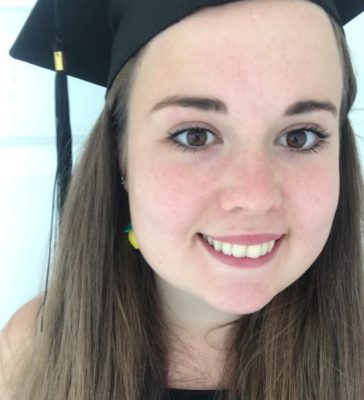
Scarlett Milner-Stopps
What did you enjoy most about your degree programme?
For the English half of my degree, I thoroughly enjoyed how many different modules were available at undergraduate level, which enabled me to develop and continue an interest specifically in postcolonial literature and theory. The weekly seminars really helped my understanding of complex theoretical themes and I learned a lot from discussions with the seminar leaders and my classmates. Studying German really improved my intercultural awareness and made me more interested in political and current events not just in Germany, but throughout Europe. I am grateful that I got to undertake a year abroad as part of my degree, which I split between studying at the University of Vienna and working for an educational publishing house in North Germany. The year abroad improved not only my German language skills, but also my independence, resilience and confidence in my own abilities.
Some of the students we are profiling have been awarded a departmental prize or award in recognition of their exceptional achievements. If this applies to you, please can you tell us about this and what it means to you?
I won joint first place of the Gamini Salgado Prize, a prize which recognises the undergraduate English dissertation that best communicates the qualities of imagination and intellectual flair. My dissertation was called ‘Special Bonus Features: The Nigerian Writer and the English Language’ and explored some of the implications of English-language writing from postcolonial nations, specifically within a Nigerian context. It also considered how genre impacts upon this debate for African writers, arguing that science fiction and other forms of speculative fiction provide possible solutions to problems caused by writing in English. This award means a lot to me as my dissertation was the most challenging piece of academic work I have ever undertaken, but also the most rewarding, as I discovered a real passion for African speculative fiction. My dissertation supervisor, Dr Kate Wallis, continually challenged and inspired me with her suggestions for improvements, and I ended the process feeling like an expert in an area in which I previously knew very little. It feels amazing to have my hard work recognised, and I hope to continue researching similar themes when I start my masters in Postcolonial Studies next year.
Please tell us if you were a member of any societies, groups or sports clubs?
Dance Society, German Society and Feminist Society.
What was the highlight of your time at Exeter?
It’s difficult to pick just one highlight, but my favourite part of each year at Exeter has always been the summer when exams finish and everyone is together celebrating our achievements and exploring Exeter and the beauty by which it is surrounded. Although this year was markedly different, one of my highlights of my university experience was my final few weeks at Exeter when restrictions were lifted enough for my friends and I to spend time together, whether at various different beaches, in the park or holding our own graduation celebrations in the garden.
What will you miss the most about University?
I will miss the experience of being on campus surrounded by like-minded people and where there is always something going on. I met so many amazing people during my time at Exeter, and in both my personal and my academic experiences of university I felt I was constantly discovering more about myself and who I wanted to be.
What advice would you give to current and future students? (If you are an international student what would you like to tell future students from back home who might be thinking about applying to study in Exeter?)
One piece of advice I was given towards the start of university was to say yes to everything, and to an extent I think it’s really important to get involved with as many things as possible, especially while you’re still figuring out your interests. But equally, I think it’s vital to remember that not every day of university will be amazing and if you need help in any capacity – whether in terms of academic tasks, career development, or personal life and mental health issues – ask for it! And if you do have the time to start thinking about your career/post-university life whilst studying and working towards achieving your goals, it will help a lot.
What are your plans now that you have graduated?
For the next year I will be working for the Civil Service in a HR role within the Department of Health and Social Care. I have also been accepted on to a masters course in Postcolonial Studies at SOAS University of London, which I will be starting in September 2021.